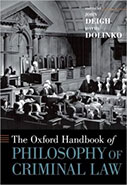Oxford Handbook Of Philosophy Of Criminal Law

Editors: John Deigh and David Dolinko
Publisher: New York: Oxford University Press, 2011. 544p.
Reviewer: Susan Dimock | May 2013
Oxford University Press advertises its Handbook series this way:
Oxford Handbooks are the new essential desktop reference for everyone working in Philosophy. These reference books for scholars and graduate students contain completely new essays written by the foremost scholars in philosophy. Everything you need to know on a range of key topics is now available in one comprehensive, superbly produced, volume.
If this is the ambition for the series, and so for this particular collection of 17 original essays, Philosophy of Criminal Law must be deemed a failure, despite some very impressive individual contributions. Before turning to those individual essays, a few remarks about the book as a whole.
The 17 original essays collected here each reflect the author’s individual vision of what his or her paper should be and do. This is in keeping with the editors’ explicit strategy. As they say, “We have deliberately refrained from setting for our contributors the precise parameters of their essays. Rather, it seemed to us best to allow each to adopt the format he or she felt most comfortable with, and we have accordingly given each wide latitude in deciding the kind of essay to include in the volume.” (p. xiii) One might have wished for a somewhat more directive, or at least guiding, editorial hand. The result is not just “a good deal of variation in the formats” (p. viii) of the essays, though there is plenty of that. As Deigh and Dolinko recognize, “Some discuss the particular answers their authors give to the issues they raise, while others present overviews of the range of approaches one finds in the literature. Some address broad topics; others focus on narrower issues.” (p. xiii) That diversity of both style and content undermines any sense of cohesion in the book as a whole. It also contributes significantly to the major weakness of the collection: there is so little uniformity in the essays that it could not possibly serve the purposes of any specific audience. Many of the papers are survey articles, and some pretty weak ones at that. There would be nothing to be gleaned from these papers for scholars working in the field; even graduate students who have a more-than-rudimentary understanding of the topics will find nothing new or interesting in them. These survey articles might be suitable as readings in an Introduction to Philosophy of Law course. Indeed, Dolinko’s own piece on punishment reads pretty indistinguishably from a good introductory lecture on the history of theories of punishment. Even as an overview focused on the central debate between retributivists and consequentialists, however, one might have hoped for a bit more balance, rather than an essay that is so unfair to retributivists as to suggest that they think punishment is an “intrinsic good” (p. 412); imagine the same charge levelled against theorists of distributive or corrective justice. Other pieces, by contrast, are much more insightful and may be significant research aids for scholars working on a specific topic or trying to understand why a particular area of substantive law is problematic. At the farthest distance from the general survey articles are others that require not just extensive familiarity with philosophical puzzles in criminal law but also a fairly sophisticated understanding of moral theory. Mitch Berman’s piece on blackmail stands at this end of the contributions; his piece on blackmail is very long and extremely complex. I’m not sure it would be accessible even to many of the readers the Handbooks are designed for. But the variation extends even to such matters as referencing. Some of the papers have bibliographies, some have selected bibliographies, and some have none at all. This is just one instance where the editors might have been more directive, and if they had, the papers might seem more like chapters in single book; as it is, the collection reads like many other anthologies (where the papers are/have been collected from a number of disparate sources), though without a clear sense of the target audience or general consistency in terms of level of difficulty and familiarity with the field assumed in the essays selected, as a good anthology would reflect. Finally, most of the papers rely exclusively and unreflectively on U.S. law (usually the Model Penal Code, at that). That there are significant differences between the treatment of various matters in the MPC and other common law jurisdictions is rarely noted by the American authors, and they presume familiarity with U.S. case law to the point that they fail to provide even a minimal summary of the cases (despite being decades old in many instances). This bias toward American law is offset somewhat by the inclusion of the work of a Canadian, English and Scottish philosopher, but nonetheless the book remains seriously unbalanced with respect to jurisdictional coverage.
Despite its weaknesses as a whole, The Oxford Handbook of Philosophy of Criminal Law contains some excellent essays, written by scholars of deservedly international reputations. Andrew Ashworth continues to rail against the expanding scope of criminal law generated by multiple layers of inchoate liability, in a very insightful paper on attempts. Michael Moore accomplishes the almost impossible task of summarizing the various doctrines of causation employed in criminal and tort law in a way that makes the general issue of causation accessible while demonstrating the philosophical complexities that doctrines of causation create. Walter Sinnott-Armstrong and Ken Levy illustrate the interplay of principle and policy in the development of insanity defences, while Marcia Baron provides an excellent overview of three doctrines typically treated under feminist jurisprudence — namely, provocation, self-defence and rape. Carol Steiker does a terrific job explaining the paradoxical nature of absolutist rejections of the death penalty from within deontology, and makes a strong case for the permissibility (at least) of capital punishment within the central deontological theory in criminal law: retributivism (though I think she mischaracterises the benefits required to ground the obligation to obey criminal law in theories based in reciprocity on p. 448). Antony Duff illustrates the incompatibility of mercy with both retributivism and consequentialism, explaining that mercy is a value extraneous to the criminal justice system, even if one that should sometimes outweigh penal justice. Finally, the book ends with a nice summary by Stephen Garvey of some possible alternatives to punishment.
Professor Susan Dimock,
Department of Philosophy,
York University,
Toronto ON Canada M3J1P3
dimock@yorku.ca


